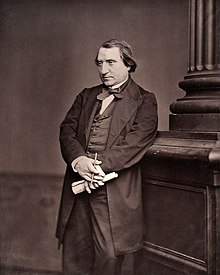
| This article is part of a series on |
| Conservatism in France |
|---|
 |
"What Is a Nation?" (French: Qu'est-ce qu'une nation ?)[1] is an 1882 lecture by French historian Ernest Renan (1823–1892) at the Sorbonne, known for the statements that a nation is "a daily plebiscite", and that nations are based as much on what people jointly forget as on what they remember. It is frequently quoted or anthologized in works of history or political science pertaining to nationalism and national identity. It exemplifies a contractualist understanding of the nation.
- ^ Renan, Ernest (11 March 1882). Qu'est-ce qu'une nation ? [What is a Nation?]. Calmann Lévy. p. 30. OCLC 958977168.